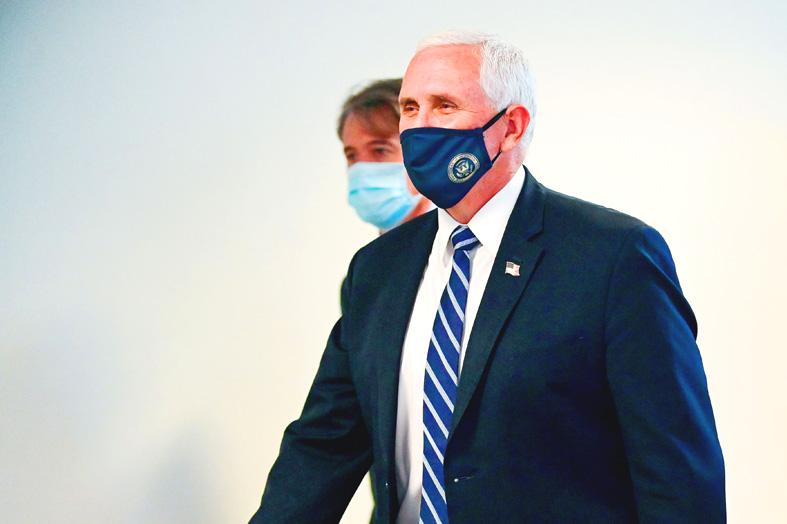US Vice President Mike Pence on Monday told governors that distribution of a COVID-19 vaccine could begin by the third week of this month, signaling that US regulators would swiftly approve an emergency authorization for the first vaccinations.
“We strongly believe the vaccine distribution process could begin the week of Dec. 14,” Pence told governors, according to a summary of the call provided by the office of Washington Governor Jay Inslee. “The American people deserve to know the cavalry is on the way.”
Pence told governors that they would have the final say on vaccine distribution as the “ultimate arbiters” in their states, the summary said.

Photo: Reuters
Moderna Inc joined Pfizer Inc on Monday in requesting that the US Food and Drug Administration (FDA) issue an emergency use authorization for its vaccine.
Both vaccines are more than 90 percent effective, according to preliminary clinical trial results, although their distribution challenges include requiring two injections.
US Secretary of Health and Human Services Alex Azar, US FDA Commissioner Stephen Hahn, US Centers for Disease Control and Prevention Director Robert Redfield and US National Institute of Allergy and Infectious Diseases Director Anthony Fauci also participated in the call.
An FDA advisory panel is scheduled to meet on Thursday next week to discuss the vaccines.
Azar told governors that distribution could begin within 24 hours of regulatory approval, while Pence said the administration believes that would be the week of Dec. 14th.
Vaccines would be largely administered by pharmacies, Azar said.
Some governors expressed surprise to learn that vaccines would be distributed to states at first based on a per-capita formula, counting only those aged 18 and older.
After the call, Minnesota Governor Tim Walz said that the administration is undecided on who should be vaccinated first.
“The Trump administration believes you vaccinate those 65 and older,” Walz told reporters. “The CDC, Dr Fauci, and others say you vaccinate the healthcare workers to get the biggest bang for the buck. Those are discussions that are happening right now.”

Chinese President Xi Jinping (習近平) is to visit Russia next month for a summit of the BRICS bloc of developing economies, Chinese Minister of Foreign Affairs Wang Yi (王毅) said on Thursday, a move that comes as Moscow and Beijing seek to counter the West’s global influence. Xi’s visit to Russia would be his second since the Kremlin sent troops into Ukraine in February 2022. China claims to take a neutral position in the conflict, but it has backed the Kremlin’s contentions that Russia’s action was provoked by the West, and it continues to supply key components needed by Moscow for

Japan scrambled fighter jets after Russian aircraft flew around the archipelago for the first time in five years, Tokyo said yesterday. From Thursday morning to afternoon, the Russian Tu-142 aircraft flew from the sea between Japan and South Korea toward the southern Okinawa region, the Japanese Ministry of Defense said in a statement. They then traveled north over the Pacific Ocean and finished their journey off the northern island of Hokkaido, it added. The planes did not enter Japanese airspace, but flew over an area subject to a territorial dispute between Japan and Russia, a ministry official said. “In response, we mobilized Air Self-Defense

The pitch is a classic: A young celebrity with no climbing experience spends a year in hard training and scales Mount Everest, succeeding against some — if not all — odds. French YouTuber Ines Benazzouz, known as Inoxtag, brought the story to life with a two-hour-plus documentary about his year preparing for the ultimate challenge. The film, titled Kaizen, proved a smash hit on its release last weekend. Young fans queued around the block to get into a preview screening in Paris, with Inoxtag’s management on Monday saying the film had smashed the box office record for a special cinema

CRITICISM: ‘One has to choose the lesser of two evils,’ Pope Francis said, as he criticized Trump’s anti-immigrant policies and Harris’ pro-choice position Pope Francis on Friday accused both former US president Donald Trump and US Vice President Kamala Harris of being “against life” as he returned to Rome from a 12-day tour of the Asia-Pacific region. The 87-year-old pontiff’s comments on the US presidential hopefuls came as he defied health concerns to connect with believers from the jungle of Papua New Guinea to the skyscrapers of Singapore. It was Francis’ longest trip in duration and distance since becoming head of the world’s nearly 1.4 billion Roman Catholics more than 11 years ago. Despite the marathon visit, he held a long and spirited